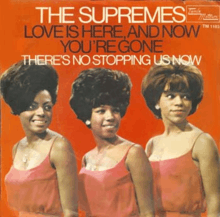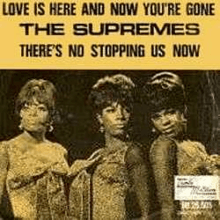Love Is Here and Now You're Gone
| "Love Is Here and Now You're Gone" | |||||||||||||||
|---|---|---|---|---|---|---|---|---|---|---|---|---|---|---|---|
 | |||||||||||||||
| Single by The Supremes | |||||||||||||||
| from the album The Supremes Sing Holland–Dozier–Holland | |||||||||||||||
| B-side | "There's No Stopping Us Now" | ||||||||||||||
| Released | January 11, 1967 (U.S.) | ||||||||||||||
| Format | Vinyl record (7" 45 RPM) | ||||||||||||||
| Recorded | Los Angeles, August 12, 1966; Hitsville U.S.A. (Studio A), September 22 & November 13, 1966 | ||||||||||||||
| Genre | Pop, R&B, psychedelic pop | ||||||||||||||
| Length | 2:48 | ||||||||||||||
| Label |
Motown M 1103 | ||||||||||||||
| Writer(s) | Holland–Dozier–Holland | ||||||||||||||
| Producer(s) |
Brian Holland Lamont Dozier | ||||||||||||||
| The Supremes singles chronology | |||||||||||||||
| |||||||||||||||
| |||||||||||||||
"Love Is Here and Now You're Gone" is a 1967 song recorded by The Supremes for the Motown label.
Written and composed by Motown's main production team Holland–Dozier–Holland, it became the second consecutive number-one pop single from the Supremes' album The Supremes Sing Holland–Dozier–Holland and the group's ninth overall chart-topper in the United States on Billboard Hot 100, peaking March 1967.[1]
Background
History
The song, which depicts a relationship in the beginning stages of breakup ("You persuaded me to love you/And I did/But instead of tenderness/I found heartache instead"), features several spoken sections from lead singer Diana Ross, who delivers her dialogue in a dramatic, emotive voice. Matching the song's drama influences is an instrumental track, featuring a prominent harpsichord and strings, which recalls both a Hollywood film score and The Left Banke's recently popularized "Baroque rock."[2]
Primarily recorded in Los Angeles, California, thousands of miles away from Motown's regular Hitsville U.S.A. recording studio, "Love Is Here, and Now You're Gone" was the #1 song on the U.S. Billboard Hot 100 for one week, from March 5 to March 11, 1967, becoming the group's ninth number-one single. The single was also the group's sixth number one on the R&B charts.[3] The girl group performed the hit record on NBC's The Andy Williams Show on Sunday, January 22, 1967,[4] going to number one seven weeks later. Lyricist Eddie Holland names "Love is Here" as his favorite Supremes song.
Personnel
- Lead vocals by Diana Ross
- Backing vocals by Florence Ballard and Mary Wilson
- Instrumentation and additional background vocals by Los Angeles area studio musicians
- Written by Brian Holland, Lamont Dozier, and Edward Holland, Jr.
- Produced by Brian Holland and Lamont Dozier
Chart history
Weekly charts
|
Year-end charts
|
Cover versions
Michael Jackson later covered "Love Is Here, and Now You're Gone" for his solo debut album, Got to Be There.[7] On the 45 versions, it was the B-side of his number two smash, "Rockin' Robin".[8] It also featured on the 'Jackson And The Beanstalk' episode of the new Jackson 5 cartoon series in 1971.[9]
Tami Lynn covered a version of this song with the title "Love Here and Now You're Gone" in her debut album, Love Is Here and Now You're Gone in 1972.[10]
Phil Collins included this song on his 2010 album of soul covers, Going Back.[11]
See also
References
- ↑ "Billboard Hot 100". Billboard. Nielsen Company. 79 (10): 22. 1967. Retrieved 10 May 2011.
- ↑ "Love Is Here and Now You're Gone". AllMusic. Retrieved 2011-03-05.
- ↑ Whitburn, Joel (2004). Top R&B/Hip-Hop Singles: 1942-2004. Record Research. p. 558.
- ↑ "January 22, 1967". The Andy Williams Show. Season 5. Episode 20. Burbank, California. 22 January 1967. NBC. KNBC.
- ↑ "Item Display - RPM - Library and Archives Canada". Collectionscanada.gc.ca. Retrieved 2016-10-01.
- ↑ "Top 100 Hits of 1967/Top 100 Songs of 1967". Musicoutfitters.com. Retrieved 2016-10-01.
- ↑ "Michael Jackson - Got To Be There (Vinyl, LP, Album) at Discogs". Discogs. Retrieved 2011-03-05.
- ↑ "Michael Jackson - Rockin' Robin at Discogs". Discogs. Retrieved 2011-03-05.
- ↑ Halstead, Craig; Cadman, Chris (2007). Michael Jackson: For The Record. Bedfordshire: Authors OnLine Ltd. p. 208. ISBN 0-7552-0267-8.
- ↑ "Tami Lynn - Love Is Here And Now You're Gone at Discogs". Discogs. Retrieved 2011-03-05.
- ↑ "Phil Collins - Going Back at Discogs". Discogs. Retrieved 2011-03-05.
| Preceded by "Ruby Tuesday" by The Rolling Stones |
Billboard Hot 100 number one single March 11, 1967 (one week) |
Succeeded by "Penny Lane" by The Beatles |
| Preceded by "Are You Lonely For Me" by Freddie Scott |
Billboard Hot R&B Singles number-one single March 11, 1967 – March 18, 1967 (two weeks) |
Succeeded by "I Never Loved a Man (The Way I Love You)" by Aretha Franklin |
